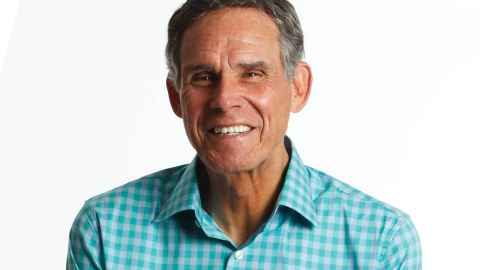Tangling with Trump: scientist as activist
2 December 2020
Eric Topol blew the whistle on what he saw as Donald Trump's undermining of the US Covid-19 response. The American heart doctor and University of Auckland visiting professor turned “full activist”.

One of the world’s foremost thinkers on the future of healthcare, Eric Topol’s bestsellers include Deep Medicine: How Artificial Intelligence Can Make Healthcare Human Again (2019). In the UK, he advised the National Health Service on making the most of technologies from genomics to robotics. Since 2018, he’s advised the University of Auckland’s National Institute for Health Innovation.
Throughout 2020, 66-year-old Topol found himself in “a living nightmare”, he said from San Diego, as US President Donald Trump’s anti-science misinformation and bullying of health officials undermined the pandemic response.
Topol called Trump out in tweets, news appearances and podcasts, stepping up his activism with a public letter in August urging the head of the Food and Drug Administration, Stephen Hahn, to “tell the truth or resign”.
The heart doctor's connection with the University of Auckland goes back to his 2018 appointment as a visiting professor.
The trigger was a White House press conference where Trump, Hahn and Health and Human Services Secretary Alex Azar hyped a plasma treatment for Covid-19 patients.
“I was just nauseous watching the three of them, Trump, Azar and Hahn, touting this absurd, unfounded ‘historic’ breakthrough. It was just balderdash,” Topol told the magazine Vanity Fair.
“It was time to go full activist and take on the FDA commissioner for being complicit with this propaganda and stagecraft,” he later told his Twitter followers.
Fearing the reckless authorisation of a Covid-19 vaccine as a pre-election stunt, Topol also publicly lobbied drug company Pfizer to hold fast to safety procedures. The scientist’s efforts may have helped, since no miraculous pre-election vaccine emerged.
In an unexpected twist, Topol soon became friends with Hahn – even interviewing him for a podcast – after becoming convinced that the FDA chief would stand up for science.
“I am not going to allow outside pressure to affect the decision-making,” Hahn said.
Topol is the founder and director of the Scripps Research Translational Institute, an independent research centre focused on personalised medicine, and the editor-in-chief of Medscape, a news and information website for clinicians. His 1975 Baccalaureate thesis was “Prospects for Genetic Therapy in Man”.
A breakthrough touted at a White House press conference was "just balderdash," Topol told the magazine Vanity Fair.
In 2018, John Fraser, Dean of the Faculty of Medical and Health Sciences, appointed Topol as a visiting professor to the university. The American collaborates with Chris Bullen, a professor of public health and director of the University’s National Institute for Health Innovation (NIHI), and Robyn Whittaker, an honorary associate professor who works for NIHI and the Waitemata District Health Board. One of his roles is educational; Topol spoke last month via Zoom at a “digital academy” for clinicians run by Whittaker and the health board.
On the research front, the scientist has long been keen on a slimmed-down Kiwi version of “All of Us”, a US research programme that aims to build a one million person database of health information to advance precision medicine, which is treatment tailored to an individual’s environment and genome. He has advised on a planned New Zealand study of “long Covid,” where people can suffer a whole range of persistent symptoms, including severe fatigue.
His activism reached unusual levels in 2020 "but these are unusual times", Topol says.
His view of the road out of the pandemic? In New Zealand, our leaders should sit tight, continuing to ignore calls to loosen restrictions for economic reasons, especially when treatments and vaccines are tantalisingly close.
“You made such a great success of it – you don’t want to lose all that public health benefit. That’s the problem in the US, there’s no patience.”
In the US, Joe Biden’s presidential victory has cleared the way for a better public health response, including in relation to masks.
Besides emerging vaccines and treatments, Topol sees potential for tools such as rapid home testing kits in helping the US to get the pandemic under control. His institute is testing wearable fitness trackers as a tool for identifying Covid-19 outbreaks, using changes in sleep, activity levels and resting heart rates as indicators of possible viral infection.
Looking back on the year, Topol notes that he would never have anticipated, earlier in his career, the need for him to take such extreme measures to defend science.
“It was somewhat unusual – but these are unusual times.”
Media contact
Paul Panckhurst | media adviser
M: 022 032 8475
E: paul.panckhurst@auckland.ac.nz